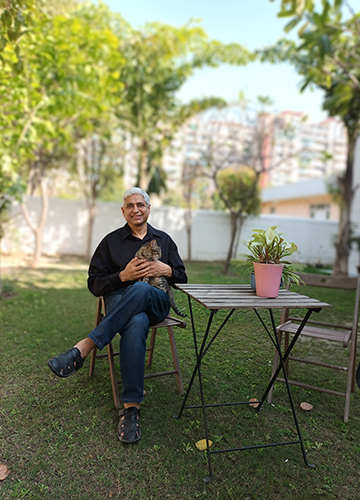On a Monday morning, diplomat and writer Vikas Swarup sits bathed in soft gold light—the kind reserved for Bollywood actresses. Spring—metaphorical and literal—has arrived. His garden is in full bloom. The new book has officially begun. “I have started writing again today,” says Swarup. His last book, The Accidental Apprentice, came out in 2013. (It was snapped up like the two before it.) He sold the movie rights to his books much before rights for books became a thing. There is interest in his fourth book even before he has written it. He has never had writer’s block—there are far too many ideas “jostling around” in his head.
The day begins early for Swarup, who is hoping to finish his book in six months. He is up at 5:30am. “I need a solid three uninterrupted hours when the world is sleeping,” he says. His cat, Rinki, a new addition to the family, sits quietly in his lap, only to vanish into the garden quickly. “She is four months old and there is interest in a tom cat,” he says.
It is new beginnings. He has retired and moved home and his book, Six Suspects, has been made into a web series, The Great Indian Murder, that has done well on OTT. Quick-witted, accessible and always dapper, Swarup took over as official spokesperson for the Ministry of External Affairs from Syed Akbaruddin. Now, on the other side, Swarup is the host of Diplomatic Dispatch on Sansad TV, a programme about foreign affairs. “It helps me keep in touch with my subject,” he says.
Swarup’s books are like blockbuster Bollywood films, with a fast-paced narrative, but at their heart is the Indian dream. “I like my books to have a hook,” he says. “I also like them to have some kind of closure. I can write avant-garde books, but I like to wrap things up.”
Vividly written, sharp and keenly observed, his books do not sugar-coat the corruption or complexity of India. There is ambition and greed, but in the end, they are stories with a heart. Almost cinematic in their description, Swarup’s books are very much masala entertainers. If there was one way to describe them, the name of the main character in his first book, Q&A—Ram Mohammad Thomas—sums it up. It is a name that represents an idea of India that is increasingly disappearing. “My books have a consciousness,” he says. “I see myself as a storyteller. I have acquired my craft only by reading.”
Growing up in a family of lawyers in Allahabad, Swarup read voraciously, even as he studied to be a civil servant. “It was decided at an early age that I was not fit for engineering or medicine,” he says. “I did not want to become a lawyer, because my mother had expressly forbidden it; there were enough lawyers in the family. So, it was decided that I would be a civil servant and I trained to be one. But I was a reader. One of the advantages of the pre-internet age was that you could play sports or watch movies or read. I read a lot.” Movies were a communal experience, with the whole family gathering together to watch them on the big screen.
Writing is not the only skill Swarup has acquired just by observation. He can play the harmonium, which he learnt while growing up. “I cannot manage anything with strings,” he says. His family is close-knit and his home bears witness to the skills of the Swarups. Wife Aparna is an artist and photographer. A large oil painting in blue of three women holds pride of place in their home. Her photographs are beautifully composed. Some idyllic, others powerful—they offer a glimpse into the worlds to which she has travelled. “The camera is power,” she says.
At the edge of the room is a piano. “We transported it from Canada,” says Swarup. His youngest son, who studied history in Edinburgh, decided that the 9-to-5 world was not for him. “He wants to be a jazz musician on a piano,” says Swarup. After practising eight hours a day on the piano for a year, he is now studying in an exclusive music school that only takes ten students at a time. “He competed with kids who had been playing the piano since they were two,” says Swarup with evident pride.


